Advertisement
How Getting Shot During A Marathon Made The 'Bullet Man' A Better Runner
Resume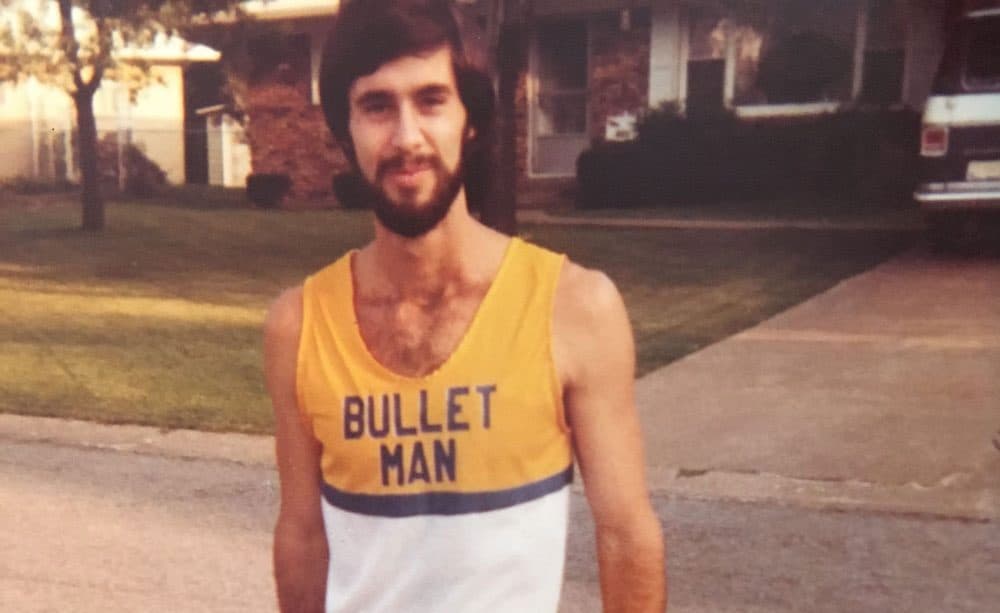
This story originally aired on April 14, 2018. This week it appears again as part of our "Sticky Wickets" episode.
Dennis Rainear was 10 miles into the Grand Valley Marathon when he was hit. Something struck the top of his head and nearly knocked him over. He staggered for a few steps.
"Put my hand immediately to my head, and it was just like in the cartoons, where you see a guy get a big goose egg on his head when he gets bonked," Dennis says. "Sure enough, I had a big goose egg on my head."
Dennis’ head started throbbing, his ears ringing, and his vision blurring. But he looked at his hand and didn’t see any blood. So, he kept running and trying to figure out what happened.
" 'What's wrong here?' " Dennis remembers asking himself. " 'It’s like running in mud. Why can't I move? This is not going the way my training has been going.' "
Never Thinking To 'Sit Or Quit'
It was 1978, right in the middle of the running boom, and it was Dennis’ fourth marathon.
He was in the best shape of his life. And he was confident he would run a personal best at Grand Valley, even though it was unseasonably warm for November in Michigan.
But after he was hit, that confidence quickly disappeared.
"I was losing about 15, 20 seconds a mile, and I was getting frustrated," Dennis says. "The further on I got, the more wobbly I got. I had a little trouble focusing my eyes. And, you know, I was trying to rationalize what in the world happened here."
Was some kid throwing rocks at runners around mile 10? Could he have been hit by a branch he didn’t see? A brick? Finally, Dennis convinced himself it had to be dehydration.
He downed Gatorade and de-fizzed Coca-Cola and dumped water on his head. Nothing helped. He pushed through the pain and the wobbliness as best he could.
More than anything, Dennis wanted to finish in three hours or better. That would qualify him for the Boston Marathon.
"I don't think I'm unique in that drive," Dennis says. "Anyone who mentioned the word marathon, the next word would be Boston, and, 'Did you go? Have you gone? Can you go?' I really had no goals beyond that at that point, just wanted to go to Boston and earn it."
That’s why he had decided to run the Grand Valley Marathon in the first place. It was a couple hours away from his home in Midland, Michigan, where he lived with his wife Linda and worked as a chemist for the Dow Corning Corporation.
Grand Valley was a small race, about 300 runners, and the course covered mostly flat, rural roads.
At the time, Dennis was 26, and his wife, Linda, was four months pregnant with the couple’s first child. Linda was waiting for Dennis at the finish just outside Grand Rapids. And she would be waiting much longer than she expected.
Dennis slowed to a walk around the 20-mile mark.
"It was only to see if it would clear my head and give me some better focus," Dennis says. "But never did the thought occur to me, 'Well, I better sit, or quit, or take a ride, or bail.' That never even occurred to me, actually."
"Why didn't that occur to you?" I ask.
"Well, it's either stupidity or dedication. You can take your pick. Probably stupidity more than anything."
"Well, I was either incredibly lucky or incredibly unlucky. I guess it's a flip of the coin, isn't it?"
Dennis Rainear
Disappointment, Then Disbelief
If he’d known then why he was slowing down, Dennis would have dropped out of the race. But all he knew was that walking only made the pain and the dizziness worse. So, he started running again.
He summoned enough energy to finish strong. He crossed the line with both hands in the air. His time was 3 hours, 9 minutes — not good enough for Boston. His wife walked over to him.
"As she approached me, she had her hands up and was clapping," Dennis says, "and then immediately said, 'I thought you were going to break three hours. What happened?' I said, 'I don't know. I feel terrible. I think somebody hit me with a brick.' "
Dennis pointed to the goose egg on the top of his head. Linda told Dennis to get it checked out by the race doctor. But Dennis was in no rush to get medical attention. He’d failed to qualify for Boston. He was disappointed and hungry.
Dennis grabbed a hot dog from the post-race food tent. Then, he started thinking about trying to qualify for Boston again. Eventually, he made his way to the race doctor.
"The physician looked at the skull, and peeled back the hair and the scalp, and probed around," Dennis recalls, "and finally said, 'I see something stuck down in your skull, and it has kind of a shine to it, like a metallic object. I think you’ve been shot. You better go to the hospital and have the emergency room take a look at this.' "
Dennis didn’t believe the race doctor. But he says, "The thought of a bullet in my head just about brought up the hot dog."
Dennis went to Butterworth Hospital in Grand Rapids with his wife. He still figured he'd been hit by a rock or a brick.
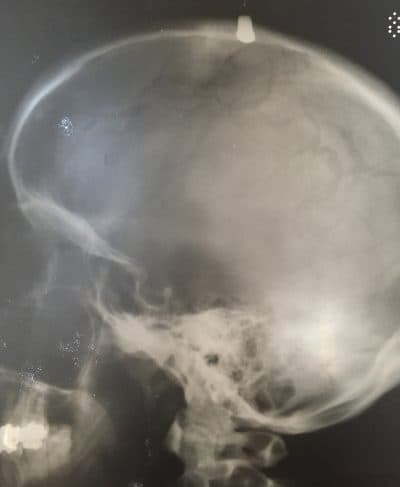
Turns out, the race doctor was right. Hospital X-rays confirmed that there was a bullet lodged in Dennis’ skull.
"I had visions of, you know, a huge army projectile kind of thing embedded in my brain matter, as your mind races away with the first news," he says. "But I was still just irritated that we hadn't broken three hours."
'Incredibly Lucky Or Incredibly Unlucky'
It was a .22-caliber bullet. And it was lodged in the thickest part of his skull, almost flattened against the top of his head, which seems lucky.
“Well, I was either incredibly lucky or incredibly unlucky," Dennis says. "I guess it's a flip of the coin, isn't it? The wrong place at the wrong time, but I was certainly lucky that it didn't do more damage or hit me in a soft spot, or that it didn't penetrate a little bit further.”
The doctor needed to remove the bullet without damaging it, because it was now police evidence.
“So, he’s trying to pull a slug that’s embedded in the skull out with plastic-tipped forceps, and now he's got Betadine, and it's pretty wet, and he couldn't get a good grip," Dennis says. "And he finally got enough of a bite on the bullet and was able to dislodge it and pull it out of the skull."
It took three stitches to sew up the entrance wound.
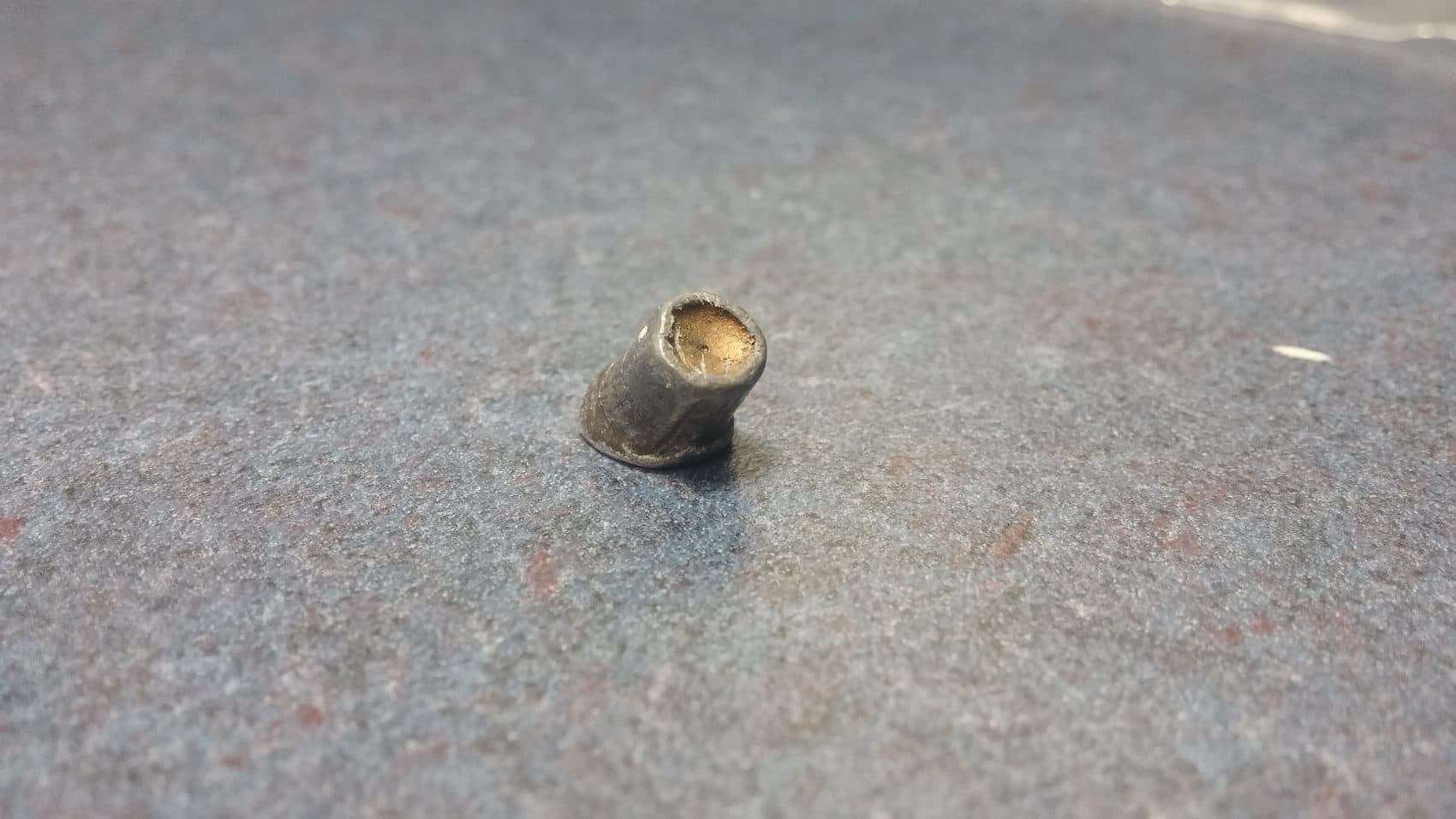
The police came and took the bullet, and asked Dennis if he had any idea how he got shot. He didn’t.
"I know one thing for sure: The bullet was there when I finished the race and it was not there when I started the race," he says. "So, they said, 'OK, thank you' and released me."
He put on some dry clothes, left the hospital and went to a nearby restaurant.
"I was a little late for our dinner with my fellow runners," he says. "They were all waiting at the restaurant for me and said, 'What happened?' I explained it."
Dennis told his fellow runners about the bullet.
"We had a good laugh about it and basically shrugged it off as just something that happened," he says. "Didn't pay much attention to it."
Dennis was back running the next day.
But a few days after the Grand Valley Marathon, he got a mysterious phone call.
The man on the other end asked Dennis what he looked like. Dennis asked why the man wanted to know.
And the man told Dennis, "'Well, I was in that race, and I would have been running about your pace, and I have some people that are unhappy with me and out to get me. I just wonder if you bought one intended for me.' "
Dennis adds: "Now, that was about the scariest thing of this whole thing. Could it possibly have been a deliberate attempt aimed at someone else?"
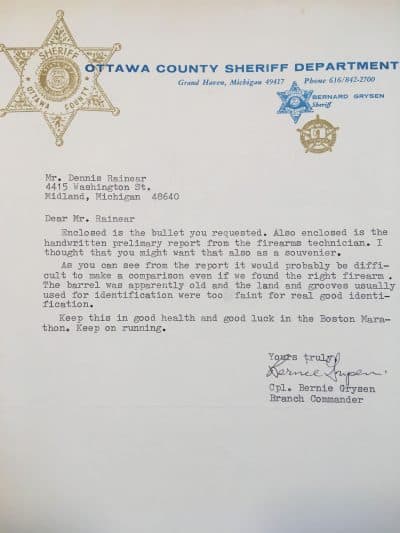
Dennis wanted some answers. So, he asked for the police report.
The police had examined the marks scratched into the bullet’s surface, the way the bullet impacted Dennis’ skull and the way it flattened out on one side.
"The bullet seemed to have been fired from a poorly maintained gun, a damaged gun, a gun that had been perhaps equipped with a silencer," he says. "It did not ricochet off of anything. It just plopped into the head."
The police never figured out where the bullet was fired from. But the marathon passed through an area where it wasn’t unusual to find hunters. And Dennis thought he was probably hit by a hunter’s errant shot, though he'll never know for sure.
'Bullet Man'
News reports about the "marathoner shot in the head" quickly spread from Michigan across the country.
And Dennis couldn’t believe all the attention he got, from TV talk shows to radio stations to newspapers. He even appeared on the game show “To Tell The Truth.”
The show’s celebrity panelists couldn't believe Dennis was telling the truth.
Back in Boston, reporters approached some marathon officials and told them what happened. The officials figured, without being shot in the head, he would have easily broken three hours and qualified. They offered him a spot in the 1979 Boston Marathon.
At the Hopkinton start, Dennis lined up wearing a singlet with the words "Bullet Man" across the front.
"Nobody else had earned it. So, I took it," Dennis says. "I picked up the moniker 'Bullet Man' for a little while, and I wore that to several races. Yeah, it was a bit of a joke on myself, I guess, but I try to take my training in running seriously, but not take myself too seriously."
Over the next four decades, he ran 21 marathons and six ultramarathons. And a DNF, or "did not finish," was never an option.
"Believe me, it's really hard to justify a DNF when you finish with a bullet in your head," Dennis says. "So, after that race, I don't think I ever failed to finish because it was — what would I say? 'I got tired?' What would I say? 'I got sore?' "
Being the "Bullet Man" pushed Dennis to train harder and run faster. His personal best in the marathon is 2 hours, 37 minutes.
"Would I have gotten there without the bullet?" Dennis asks. "It's quite likely I would not have."
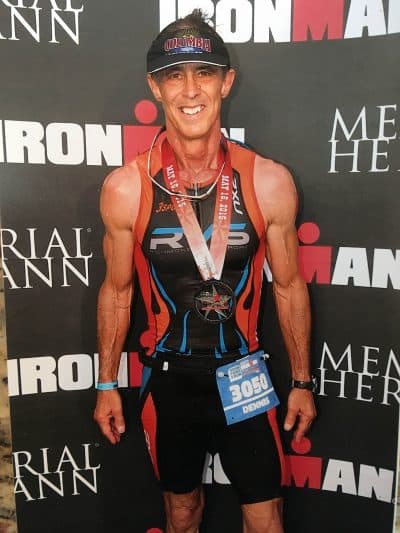
"Let me get this straight: getting shot in the head made you a better marathoner?" I ask.
“Yes, yes."
Post-bullet, Dennis became a patent lawyer and moved to Virginia. Almost 40 years later, he’s retired and splits his time between training for his next big race and visiting his five grandchildren.
As for the bullet?
"It’s in a little Ziploc baggie, and it has taken several trips to school as show and tell for the kids," he says.
Dennis is still surprised by the attention that followed the Grand Valley Marathon, but he admits, "it's not the kind of thing you read about all that often."
"Yeah, I'd be hard pressed to find another marathoner shot in the head who finishes a marathon," I say.
“Well, it was only 16 miles with the bullet. So it wasn't the whole way."
That’s typical Dennis. Now, sometimes he’ll deny he’s the "Bullet Man." Or, he’ll try.
"I think it will be on my tombstone," he says.
This segment aired on December 29, 2018.
